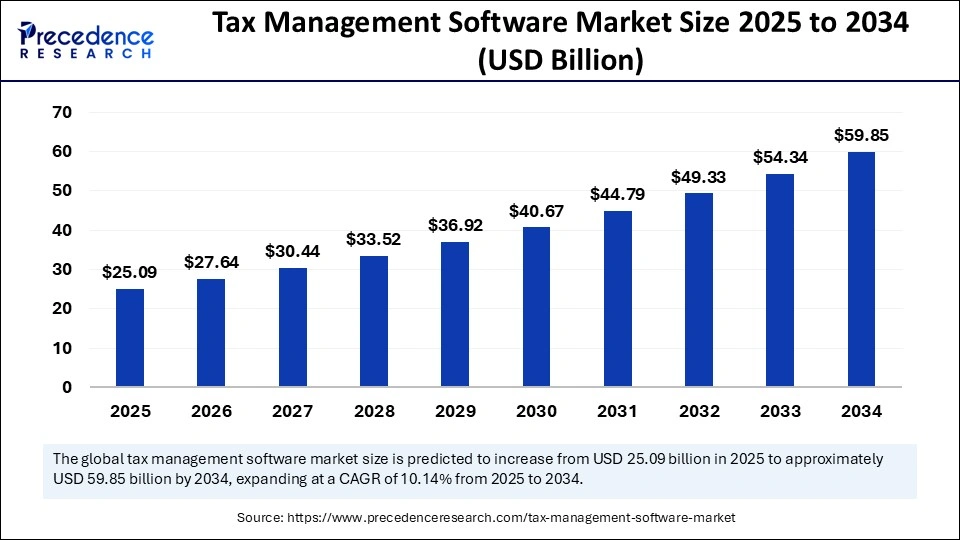
Tax Management Software Market Key Takeaways
- North America dominated the market with the largest share around 29% in 2024.
- Asia Pacific is expected to expand at the fastest CAGR during the forecast period.
- By component, the software segment dominated the market with the highest share of 73% in 2024.
- By component, the professional services segment is expected to witness significant growth during the projected timeframe.
- By type, the tax compliance software segment captured the biggest market share of 27% in 2024.
- By type, the tax prepared software segment is expected to grow at the fastest CAGR during the forecast period.
- By tax type, the direct tax segment led the market with the largest share of 54% in 2024.
- By tax type, the indirect tax segment is projected to grow at the fastest CAGR during the projection period.
- By deployment, the on-premises segment held the largest market share of 52% in 2024.
- By deployment, the cloud segment is expected to grow at the fastest CAGR in the coming years.
- By organization size, the large enterprises segment dominated the market in 2024.
- By organization size, the small & medium enterprises segment is expected to grow at the fastest CAGR in the upcoming period.
- By industry vertical, the BFSI segment dominated the market with the largest share in 2024.
- By industry vertical, the retail segment is expected to grow at the fastest CAGR between 2025 and 2034.
Market Overview
The tax management software market is emerging as a critical enabler of business efficiency in an era of increasing fiscal scrutiny and globalization. These software solutions streamline processes related to tax calculation, regulatory compliance, and reporting across various industries. The market is experiencing heightened demand due to the adoption of digital finance practices, a growing volume of financial transactions, and the global push for tax transparency. The convergence of cloud computing, data analytics, and AI is driving innovation within this space.
Drivers
Key drivers for the tax management software market include the acceleration of digital transformation and the need for error-free tax compliance. The complexity of managing taxes in multi-jurisdictional environments has compelled businesses to seek automated solutions that reduce manual intervention. Regulatory developments, such as Making Tax Digital in the UK and e-invoicing mandates in Europe and Asia, are also catalyzing adoption. Companies are increasingly prioritizing software that supports real-time tax calculations and seamless data integration across financial systems.
Opportunities
The growing emphasis on digital tax filing and audit trail creation presents an opportunity for software providers to enhance features around data security, audit management, and historical tax analysis. Custom solutions for freelancers, gig workers, and small businesses are also in demand as non-traditional work arrangements expand globally. Furthermore, opportunities abound in delivering multilingual, multi-currency platforms that serve multinational corporations and cross-border operations.
Challenges
The market faces several challenges, including rapid shifts in global tax policy that require constant software updates and agility from vendors. Integrating tax management tools with legacy systems can be resource-intensive for enterprises. Data migration and system interoperability also remain significant hurdles. Additionally, user resistance to adopting new technologies, especially in traditional finance departments, can slow implementation and reduce the immediate return on investment.
Regional Insights
In North America, the complexity of federal, state, and local tax codes has driven early and widespread adoption of advanced tax software. Europe’s market is shaped by VAT compliance needs and stringent data protection laws like GDPR, requiring robust security features. The Asia-Pacific region is witnessing rapid adoption due to government-led digital tax initiatives, especially in countries like Singapore, Japan, and South Korea. In Africa and Latin America, governments are pushing digital tax reforms to curb tax evasion, opening new markets for global providers.
Recent Developments
Recent developments include the integration of blockchain for enhanced transaction transparency and the emergence of self-service tax portals for end-users. Vendors are also offering APIs that allow developers to embed tax calculation functionality directly into e-commerce or accounting platforms. Cloud migration is accelerating, with providers offering SaaS models that support scalability and remote access. Mergers and acquisitions within the fintech space are resulting in bundled offerings that combine tax management with broader financial operations tools.
Tax Management Software Market Companies
- Wolters Kluwer N.V
- SAP SE
- Thomson Reuters
- Intuit, Inc.
- Corvee, LLC
- HRB Digital LLC
- TaxJar
- Vertex, Inc.
- TaxSlayer LLC
- Avalara, Inc.
Segments Covered in the Report
By Component
- Software
- Professional Services
By Type
- Corporate Tax Software
- Professional Tax Software
- Tax Preparer Software
- Tax Compliance Software
- Others
By Tax Type
- Indirect Tax
- Direct Tax
By Deployment
- Cloud
- On-premises
- By Organization Size
- Large Enterprises
- Small & Medium Enterprises
By Industry Vertical
- BFSI
- Healthcare
- Retail
- Manufacturing
- Real Estate
- Others
By Region
- North America
- Europe
- Asia Pacific
- Latin America
- Middle East & Africa
